中考形容词、副词复习与练习(重要)
中考英语形容词和副词用法总结
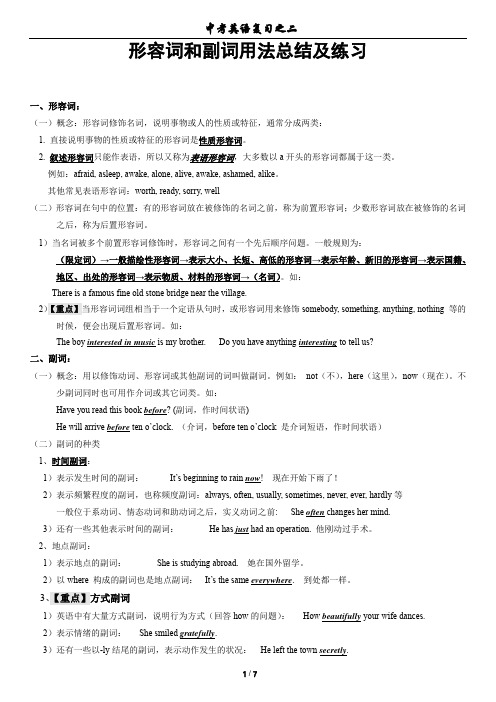
形容词和副词用法总结及练习一、形容词:(一)概念:形容词修饰名词,说明事物或人的性质或特征,通常分成两类:1. 直接说明事物的性质或特征的形容词是性质形容词。
2. 叙述形容词只能作表语,所以又称为表语形容词,大多数以a开头的形容词都属于这一类。
例如:afraid, asleep, awake, alone, alive, awake, ashamed, alike。
其他常见表语形容词:worth, ready, sorry, well(二)形容词在句中的位置:有的形容词放在被修饰的名词之前,称为前置形容词;少数形容词放在被修饰的名词之后,称为后置形容词。
1)当名词被多个前置形容词修饰时,形容词之间有一个先后顺序问题。
一般规则为:(限定词)→一般描绘性形容词→表示大小、长短、高低的形容词→表示年龄、新旧的形容词→表示国籍、地区、出处的形容词→表示物质、材料的形容词→(名词)。
如:There is a famous fine old stone bridge near the village.2)【重点】当形容词词组相当于一个定语从句时,或形容词用来修饰somebody, something, anything, nothing 等的时候,便会出现后置形容词。
如:The boy interested in music is my brother. Do you have anything interesting to tell us?二、副词:(一)概念:用以修饰动词、形容词或其他副词的词叫做副词。
例如:not(不),here(这里),now(现在)。
不少副词同时也可用作介词或其它词类。
如:Have you read this book before? (副词,作时间状语)He will arrive before ten o’clock. (介词,before ten o’clock 是介词短语,作时间状语)(二)副词的种类1、时间副词:1)表示发生时间的副词:It’s beginning to rain now! 现在开始下雨了!2)表示频繁程度的副词,也称频度副词:always, often, usually, sometimes, never, ever, hardly等一般位于系动词、情态动词和助动词之后,实义动词之前: She often changes her mind.3)还有一些其他表示时间的副词:He has just had an operation. 他刚动过手术。
中考语法冲刺总练习-形容词、副词讲解及提升练习(有答案)
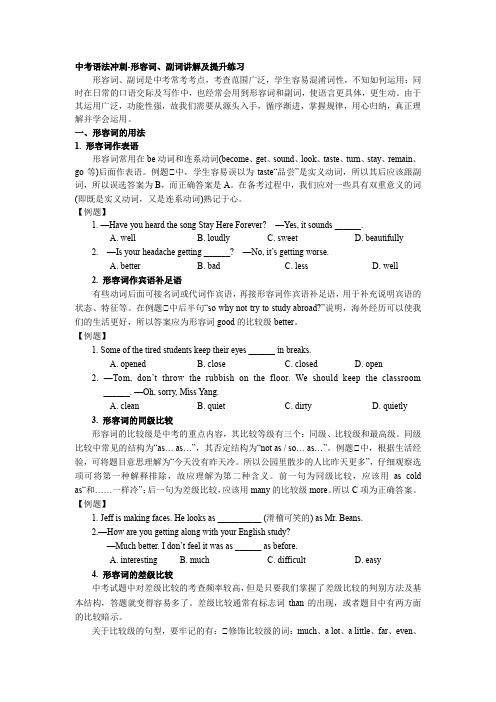
中考语法冲刺-形容词、副词讲解及提升练习形容词、副词是中考常考考点,考查范围广泛,学生容易混淆词性,不知如何运用;同时在日常的口语交际及写作中,也经常会用到形容词和副词,使语言更具体,更生动。
由于其运用广泛,功能性强,故我们需要从源头入手,循序渐进,掌握规律,用心归纳,真正理解并学会运用。
一、形容词的用法1. 形容词作表语形容词常用在be动词和连系动词(become、get、sound、look、taste、turn、stay、remain、go等)后面作表语。
例题②中,学生容易误以为taste“品尝”是实义动词,所以其后应该跟副词,所以误选答案为B,而正确答案是A。
在备考过程中,我们应对一些具有双重意义的词(即既是实义动词,又是连系动词)熟记于心。
【例题】1. —Have you heard the song Stay Here Forever? —Yes, it sounds ______.A. wellB. loudlyC. sweetD. beautifully2. —Is your headache getting ______? —No, it’s getting worse.A. betterB. badC. lessD. well2. 形容词作宾语补足语有些动词后面可接名词或代词作宾语,再接形容词作宾语补足语,用于补充说明宾语的状态、特征等。
在例题②中后半句“so why not try to study abroad?”说明,海外经历可以使我们的生活更好,所以答案应为形容词good的比较级better。
【例题】1. Some of the tired students keep their eyes ______ in breaks.A. openedB. closeC. closedD. open2. —Tom, don’t throw the rubbish on the floor. We should keep the classroom______. —Oh, sorry, Miss Yang.A. cleanB. quietC. dirtyD. quietly3. 形容词的同级比较形容词的比较级是中考的重点内容,其比较等级有三个:同级、比较级和最高级。
中考英语形容词-副词复习

形容词的构成通常有:
1、+ful
forget—forgetful
help—helpful
wonder—wonderful use—useful
care—careful
beauty—beautiful
thank-thankful
colour ----colourful
farther/further farthest/furthest older/elder oldest/eldest
as+形容词原形+as
Tom is as tall as Mike.
There are as many students in our
school as yours.
否定 not as+形容词原形+as “和… 不一样”
注意:
中考英语专项复习 形容词和副词
①最高级前可以有序数词来修饰。例如:
Which is the first most useful
invention? 哪一个是第一个最有用途的发明?
②如果形容词最高级前有物主代词,指示代 词,名词所有格时,则不必加定冠词the。 例如:
Yesterday was my busiest day. 昨天是 我最忙碌的一天。
Which is easier, maths or English? 3、能修饰比较级的副词及短:much(…的多)、 a lot(…的多)、even(更…)、still(更…)、a bit/alittle(…一点儿)
This city is much more beautiful than
hat one
明确这两种词的基本意义以及在语句中的功能和 位置, 如形容词具有修饰和限定作用,一般用来 修饰名词,在语句中可用作定语和表语;
中考英语专题复习(九)形容词、副词(含练习与答案).
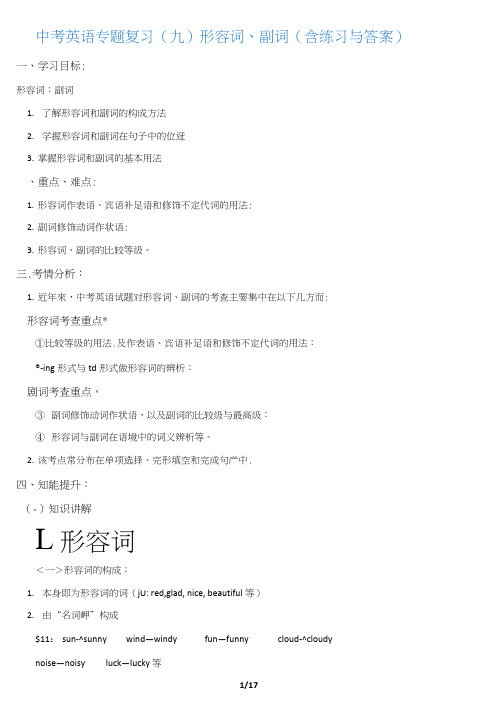
中考英语专题复习(九)形容词、副词(含练习与答案)一、学习目标:形容词:副词1.了解形容词和副词的构成方法2.学握形容词和副词在句子中的位迓3.掌握形容词和副词的基本用法、重点、难点:1.形容词作表语、宾语补足语和修饰不定代词的用法:2.副词修饰动词作状语:3.形容词、副词的比较等级。
三.考情分析:1.近年來,中考英语试题对形容词、副词的考査主要集中在以下几方而:形容词考查重点*①比较等级的用法.及作表语、宾语补足语和修饰不定代词的用法:®-ing形式与td形式做形容词的辨析:剧词考査重点,③副词修饰动词作状语,以及副词的比较级与最髙级:④形容词与副词在语境中的词义辨析等。
2.该考点常分布在单项选择、完形填空和完成句产中.四、知能提升:(-)知识讲解L形容词<一>形容词的构成:1.本身即为形容词的词(jU: red,glad, nice, beautiful等)2.由“名词岬”构成$11: sun-^sunny wind—windy fun—funny cloud-^cloudynoise—noisy luck—lucky 等3.形容词具仃独特的后缀形式主要右:-able, -ible, -al, -ical, -ant, -ary, -ful, -less, -ous 等.如:comfortable, terrible, national, natural, political, chemical, imports nt, pleasa nJ ordinary, necessary, beautiful, wonderful, careful^ hopeless, careless, famous^ dangerous 等。
4.以」y结尾的形容词如:friendly友好的:lonely孤独的:lovely可爱的:等v二〉形容词的用法及位置1.作定语形容词修饰名词时迓于名词Z前:修饰不定代词时,置于不定代词之后。
2022届中考英语复习语法真题训练:形容词副词【含答案】
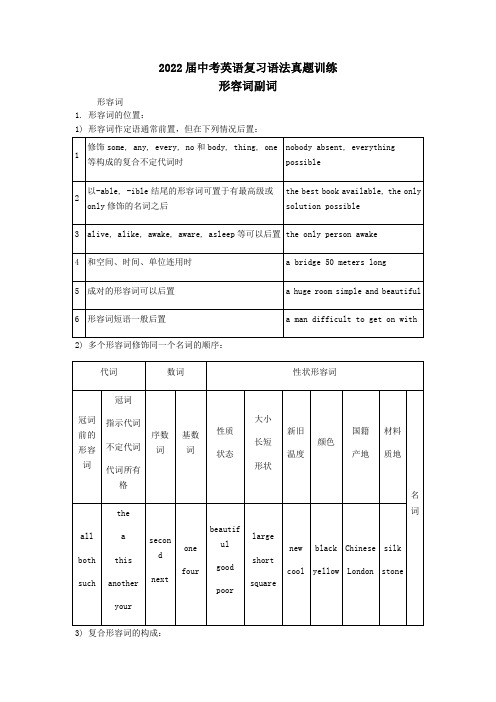
2022届中考英语复习语法真题训练形容词副词形容词1. 形容词的位置:1) 形容词作定语通常前置,但在下列情况后置:1修饰some, any, every, no和body, thing, one等构成的复合不定代词时nobody absent, everythingpossible2以-able, -ible结尾的形容词可置于有最高级或only修饰的名词之后the best book available, the onlysolution possible3alive, alike, awake, aware, asleep等可以后置the only person awake4和空间、时间、单位连用时 a bridge 50 meters long5成对的形容词可以后置 a huge room simple and beautiful 6形容词短语一般后置 a man difficult to get on with 2) 多个形容词修饰同一个名词的顺序:代词数词性状形容词冠词前的形容词冠词指示代词不定代词代词所有格序数词基数词性质状态大小长短形状新旧温度颜色国籍产地材料质地名词all both suchtheathisanotheryoursecondnextonefourbeautifulgoodpoorlargeshortsquarenewcoolblackyellowChineseLondonsilkstone3) 复合形容词的构成:1形容词+名词+ed kind-hearted6名词+形容词world-famous 2形容词+形容词dark-blue7名词+现在分词peace-loving 3形容词+现在分词ordinary-looking8名词+过去分词snow-covered 4副词+现在分词hard-working9数词+名词+ed three-egged 5副词+过去分词newly-built10数词+名词twenty-yearII. 副词副词的分类:1时间副词soon, now, early, finally,once, recently5频度副词always, often, frequently,seldom, never2地点副词here, nearby, outside,upwards, above6疑问副词how, where, when, why3方式副词hard, well, fast, slowly,excitedly, really7连接副词how, when, where, why,whether, however, meanwhile4程度副词almost, nearly, very,fairly, quite, rather8关系副词when, where, whyIII. 形容词和副词比较等级:形容词和副词的比较等级分为原级,比较级和最高级。
中考英语形容词和副词及练习
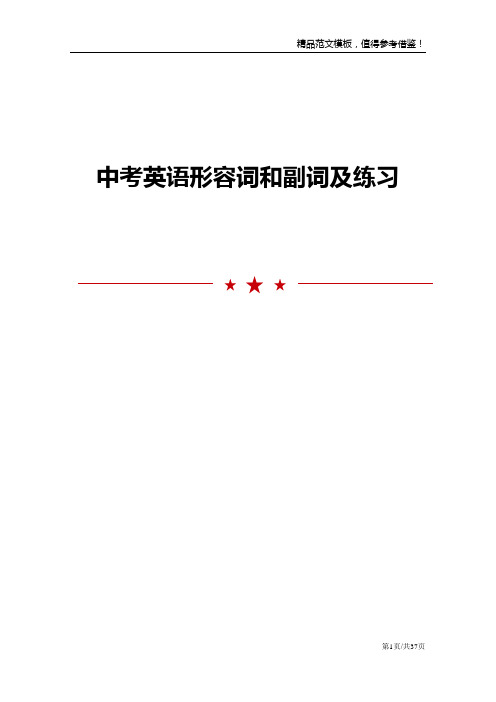
中考英语形容词和副词及练习中考英语形容词和副词及练习备考恰恰像马拉松赛跑一样,只有坚持到最后的人,才能称为胜利者,中考备考全面启动。
为了帮助大家坚持学习,高效备。
考下面是给大家带来的中考英语形容词和副词及练习,欢迎大家阅读参考,我们一起来看看吧!初三英语语法:形容词和副词一、形容词的用法:形容词修饰名词,说明事物或人的性质或特征。
也可以放在联系动词后面作表语。
1.直接说明事物的性质或特征的形容词是性质形容词,它有级的变化,可以用程度副词修饰,在句中可作定语、表语和补语。
That’s a heavy box.(定语) He’s very happy to come here.(表语)The good news made me very happy.(宾语补足语)2.有些形容词是表语形容词。
这类形容词没有级的变化,也不可用程度副词修饰。
例如:afraid 害怕的alone单独,独自asleep睡着的ill生病的。
He is an ill man. (错) The man is ill. (对)She is an afraid girl.(错) The girl is afraid. (对)这类形容词还有:well,(身体)好的unwell(身体)不舒适的,alike相象的,alive活着的, awake醒着的等。
3.形容词作定语修饰名词时,要放在名词的前边。
但是如果形容词修饰something, anything, nothing, somebody, nobody 等不定代词时,要放在这些词之后,例如:something nice1.)4.形容词使用中应注意的几个问题:1)大部分形容词加-ly可构成副词。
但friendly友好的,lovely 可爱的,lonely孤单的,lively热闹的,有生气的,活泼的,等仍为形容词。
She sang lovely. (错) ------ Her singing was lovely. (对)He spoke to me very friendly.(错)------ He spoke to me in a very friendly way. -(对)politely, truly, terribly2)某些形容词加上定冠词可以泛指一类人,与谓语动词的复数连接。
初中英语《形容词副词比较级和最高级》中考复习详解及训练试题
初中英语《形容词副词比较级和最高级》中考复习详解及训练试题一.形容词和副词的比较级和最高级的变化方法如下(1) 符合规则的:( 1)和冠词连用the +形容词原级+v(复),指一类人或物the +形容词比较级,指两者中“较…的”的那一个,eg. the younger of thea/ an +形容词比较级eg. The pen is expensive. I want a cheaper one.( a) +most+形容词最高级“非常…”eg. a most beautiful city( 2 ) 相关结构a. 原级比较:肯定句as….as…., 否定句not so / as….as…..b.比较句:比较级+than….或more (less) ….than…..The furniture in this shop is less beautiful than that in that shop.c.比较级+and+比较级或more and more+比较级“越来越… ”richer and richer, more and more interestingd. The more….., the more…..“越…,越…”The more you look at the picture, the better you will like it.e. 比较级+than any other +n. (单)(适用于范围一致时)(all) other +n.(复)any +n.(单) (适用于范围不一致时)He is taller than any other student / all other students in his class.any student in my class.f. 倍数表达法。
A is three(four, etc.)times the size(height, length etc.)of B.A is three(four, etc.)times as big(high, long, etc.)as B.A is three (four, etc.)times bigger(higher, longer, etc.)than B.用times 表倍数通常用于三倍以上,两倍可以用twice或double.The new building is four times the size (the height)of the old one.Asia is four times as large as Europe.Your school is three times bigger than ours.g. 最高级+of/ in/ among…. He is the tallest of the three/ among them/ in is class.四、形容词、副词(原级、比较级和最高级)练习I、用适当形式填空:1. Bob is _________ (young) than Fred but ___________ (tall) than Fred.2. Ying Tian is not as ___________ (tall) as Yong Xian.3. Almost all the students' faces are the same but Li Deming looks _______ (fat) thanbefore the holidays,4.Which is _________ (heavy),a hen or a chicken?5.-- How _________ (tall) is Sally?-- She' s 1.55 metres ________ (tall). What about Xiaoling?-- She' s only 1.40 metres ________ (tall). She is much _______ (short) than Sally.She is also the _______ (short) girl in the class.6. He is ______ (bad) at learning maths. He is much _______ (bad) at Chinese and he is the _________ (bad)at English.7. Annie says Sally is the ________ (kind) person in the world.8. He is one of the_________(friendly) people in the class, I think.9. A dictionary is much _________ (expensive) than a story-book.10. An orange is a little ______ (big) than an apple, but much ________ (small) than a watermelon.11. The Changjiang River is the _______ (long) river in China.12. Sue is a little ________ (beautiful) than her sister.13. My room is not as _________ (big) as my brother' s.14.--How difficult is physics?--I' m not sure.-- Is it ________ (difficult) than maths?-- I don’t think so.15. --Annie plays the piano very ___________ (well).-- Sue plays it _____ (well) than Annie. And Sally plays it the __________ (well).16. Saturday is my _________ (busy) day in a week.17. Her mother is getting ____________(fat) and ________ (fat).18. I think it’s too expensive. I’d like a _____________ (cheap) one.19. He comes to school much ____________ (early) than I.20.This book is not as _____________ (interesting) as that one.21. Your classroom is __________(wide) and _________(bright) than ours.22. Practise as __________ (much) as you can.23. The ________ (much), the ____________ (good).24. Nowadays English is _________( important ) than any other subject, 1 think.25. Most of the students think a lion is much ________(dangerous) than a bear and it is the __________ (dangerous) animal in the world.II、改错:1. He is as taller as I am.2. She is a little thiner than she looks.3. Bob is heavier than any other boys in the class.4.The girls study the better than the boy.5. It is one of the most interesting book than I have ever read.6. He says Mary is most friendliest person in the class.7. Which city is most beautiful, Beijing or Guangzhou?8. Jack works hard. Mike works very harder than Jack.9. London is the bigger city in Britain.10.Bob plays football badly but Fred plays football much badlier than Bob.III、完成句子:1 她看起来不如玛丽年轻。
中考英语专项复习专题【形容词、副词】(附例题以及答案)
中考英语专项复习专题【形容词、副词】(附例题以及答案)本章节内容1.形容词的基本作用2.形容词语境辨析3.形容词词组4.副词的基本作用5.副词语境辨析6.形容词、副词等级7.正确形式填空1 形容词的基本作用一、形容词的定义及位置形容词是用来描述或修饰名词或代词的一类词,用以说明人或事物的性质和特征。
1.作定语一般放在名词之前,复合不定代词之后。
He lives in a beautiful house.他住在一座漂亮的房子里。
There is nothing important in today’s newspaper.今天的报纸上没有什么重要的内容。
2.作表语,放在连系动词(be,feel,look,smell,taste,sound,get,become,keep,turn,seem 等)之后。
His idea sounds great.他的主意听起来很棒。
3.作宾语补足语,放在宾语之后,常与make,leave,keep,find等动词连用。
They keep the classroom clean every day.他们每天保持教室干净。
We find it important to learn English well.我们发现学好英语很重要。
4.形容词的名词化有些形容词放在定冠词之后变成名词,表示一类人,常见的有:good/bad,rich/poor,young/old,deaf/blind, black/white,living/dead等The old should be taken good care of.老年人应该受到很好的照顾。
2形容词词义辨析rich富有的↔ poor贫穷的happy高兴的↔ angry生气的short短的↔ long长的same相同的↔ different不同的3形容词短语辨析形容词短语在单项填空中考查词义辨析,在词组翻译中考查词义及拼写。
这就要求不仅要知道意思,还要能准确地写出来。
备战中考——初中英语形容词副词专项练习(含答案)
初中英语形容词副词专项练习(含答案)★★★★★★形容词专项练习【形容词修饰be动词、系动词、名词】一.中考考点:1.形放不后(即形容词放在不定词之后)如:somewhere warm2.形放系后(即形容词放在系动词之后)常见的系动词:mak e(使) be become look(看起来) get(变得) sound turn(变得) smell feel taste keepa. He looks at me ____.(happy)He looks ____.(happy)b. keep后常用open、 closed 、clean、 healthyc. It made us____.(angry)3. The + 形容词表一类人做主动词用复数形式 .The blind/rich/old/young____(be)kind.二.比较级构成规则.1.+ er/est colder coldest2.e + r/st nicer nicest(large)3.双写+ er/est(big hot fun fat wet red thin)4.辅音字母 + y 将y变i + er/est happy_happier、happiest (busy)5.多音节前 + more/most(beautiful delicious interesting exciting popular careful difficult)三.不规则.四.标志词1.比较级的标志:much(too much)、a little、than、or(二者比较)、not any、even、far 、a lot 、between.2.最高级的标志:in 、of all、of(≧3者比较)、or(≧3者比较)、among.3.修饰形副原形的有:very so too(much too) quite rather as enough.4.形容词最高级前必加the,副词最高级前可不加the.5.以加ly 构成的单词前加more/most构成比较级、最高级.6.in/of(in表示不同类/ of表示同类)He is the tallest of all the students.He is the tallest in the class.7.as as用于各种句型,so as用于否定句.⑴ He is as tall as I.He isn’ t as(so) tall as I.⑵ He ran as slowly as I did.He didn’t run as(so) slowly as I did.五.特殊句型1.of two 用the 加比较级⑴He is ____(old)of the twins.⑵He is ____(tall)of the two.2.⑴倍数加as as He is twice as old as I.⑵倍数加比较级加than He is three times older than you.3.越来越……⑴单音节:比较级and比较级better and better、more and more、warmer and warmer、bigger and bigger、⑵多音节:more and more+形容词more and more beautiful/popular4.the 比较级,the 比较级越…就越…⑴单音节:The higher the mountain is, the thinner the air is.The more, the better.The more friends we have, the happier we are.⑵多音节:The more difficult it is, the more important it is.5.第几(长)…⑴单音节:the longest river/the second longest river/thethird longest river⑵多音节:the most useful invention/ the second most usefulinvention/ the third most useful invention/ the fourthmost useful invention【练习】1.He became so ____(care).2.He said it was ____(sun)the day before yesterdaythan today.3.He ran ____(slow)of all.4.I’m ____(care)in the class.5.Tom’s ____(thin)of two.6.She’s ____(popular)of the two.7.He went there as early as we ____.8.I’m busier than he ____.9.She laughs louder than I ____.10.It’s ____________________.(第四好吃)11.第二快车____________________.12.第五好人____________________.13.越来越胖____________________.14.越来越有趣____________________.15.越来越少的书___________________.16越好吃,越高兴. __________________.17.The clever _____(not like)it.18.Which’s _____(happy),A or B ?19. _______________(越高兴)he played ,the more he wanted to play.20.This is much too ____,that is too much ____ .(hot)★★★★★★副词专项练习【副词修饰实义动词、形容词、副词】一. 形副同形1.early late fast high straight(早晚快高直)2.well⑴(adj.)身体好look/be well⑵(adv.)修饰实动study/sleep wellHard⑵adj.)难的、硬的⑵(adv.)努力地、猛烈地 It rained hard./I study hard.二.adj.+ly 构成 adv.1. +lyusual quiet clear careful quick wonderful real bright slowbad kind loud polite wide safe2. 辅音字母 + y 将y变i+lyhappy lucky easy angry noisy3. 去e+lyterrible true possible probable三. +ly构成的形容词daily lonely friendly lovely lively(日常孤单朋友爱热闹)四.here 、there 、home、where(adv.)副词前不可用to等介词1.get here /there /home(adv.)come here/ go there /home(adv.)go /get to my home(n.)2. ⑴ Where did you go ? (adv.)Which place did you go to ?(n.)⑵ Where did you live ?(adv.)Which floor did you live on ?(n.)五.too …to …(too后用形副原形; to后用动原)so …that…(so后用形副原形;that,连词后用句子)1.选择题 A. so …that… B. such …that… C. too …to …1) ()He’s __ young __ go to school .2) ()He’s __a young boy __ he can go to school .3) ()He’s __ young __ he can go to school .2.He’s too happy to see me .(他见到我太高兴了)六. enough…to…(enough用于名词之前形副之后,to后用动原)1. He had ________ .(足够的食物)2. He’s ________(足够富)to have a car.He did it ________(足够认真)to do it well.七.1. hard努力的 hardly几乎不2. near附近 nearly几乎3. hardly ====== not nearly/almost八.A.also 肯定句中“也”B.too 肯定句末“也”前用逗号隔开C.as well肯定句末“也”前无逗号隔开D.either否定句末“也”前用逗号隔开选择填空(填序号)()1.I ___ like it.()2.I don’t like it,___.()3.He likes it,I like it,___.()4.I like it ___.九.much too === too 后用形副原形too much === much 后用不可数名词或比较级too many === many 后用复名十.1.near to / next to / close to靠近2.near 用于名词之前 near the school3.nearby 用于动词名词之后①They played(v.)nearby.②Where’s the shop(n.) nearby?十一. 1. how long 对since…/ for…提问2. how soon对in+时间段提问3. how far对距离提问4. how often①对一般现在时时间标志(即频度副词)often usually sometimes always every(day) on Sundays twice a day提问②对多久一次提问如twice a day十二. ①already用于肯定句 yet 用于否定句②often usually always both all用于be动词、助动词后,实义动词前。
2022年中考英语专项复习02:形容词、副词考点讲解和练习题(解析)
2022年中考英语专项复习02:形容词、副词考点讲解和练习题(解析)【考点直击】1. 形容词的用法;2. 副词的用法;3. 形容词和副词原级、比较级、最高级的用法;4. 形容词和副词在句中的区别和位置。
【名师点睛】1. 形容词的用法(1) 形容词在句中作定语, 表语, 宾语补足语。
例如:Our country is a beautiful country. (作定语)The fish went bad. (作表语)We keep our classroom clean and tidy. (作宾语补足语)(2) 形容词修饰something, anything, nothing, everything等不定代词时,形容词放在名词后面。
I have something important to tell you.Is there anything interesting in the film.(3) 用and 或or 连接起来的两个形容词作定语时一样把它们放在被修饰的名词后面。
起进一步说明的作用。
Everybody, man and woman, old and young, should attend the meeting.You can take any box away, big or small.(4) the+形容词表示一类人或物The rich should help the poor.2. 副词的用法(1) 副词在句中可作状语,表语和定语。
He studies very hard. (作状语)Life here is full of joy. (作定语)When will you be back? (作表语)副词按其用途和含义可分为下面五类:1)时刻副词时刻副词通常用来表示动作的时刻。
常见的时刻副词有:now today, tomorrow, yesterday, before, late, early, never, seldom, sometimes, often, usually, always等。
- 1、下载文档前请自行甄别文档内容的完整性,平台不提供额外的编辑、内容补充、找答案等附加服务。
- 2、"仅部分预览"的文档,不可在线预览部分如存在完整性等问题,可反馈申请退款(可完整预览的文档不适用该条件!)。
- 3、如文档侵犯您的权益,请联系客服反馈,我们会尽快为您处理(人工客服工作时间:9:00-18:30)。
★类似的有:put it/them on
take it/them off turn it/them on/off hand it/them in
三、形容词、 副词的原级、比较级和最高级
1、分类:形容词和副词有原级、比较级和最高级三级。
原级变为比较级和最高级有规则变化和不规则变化两种。 2、规则变化:
表达方式和意义
例句
备注
肯
定
同
形
原等
式
As+原级+as (像……一样)
Art is as interesting as music. Play as well as you can.
级程 度
否
English is not so difficult as
注意 I don’t
定 not + so (as) +原级+as science.
③.Tom isn’t as/so tall as Mike. = Tom is shorter than Mike.
= Mike is taller than Tom. = Tom is less tall than Mike.
④.This book isn’t as/so interesting as that book.
(1) 单音节和部分双音节形容词和副词,在原级的后面加上 er,est 构成比较级和最高级 。 a)直接加 er,est :b)以重读闭音节结尾的,要双写最后一个辅音字母,后加 er,est : c)以辅音字母+y 结尾的,先把 y 改为 i 再加上 er,est:
(2)两个音节或两个以上的音节的,在原级前加 more / most. 3、不规则变化:
years.(我离开家乡有将近 20 年了) / Jim is over there.(吉姆就在那边)
(3)作定语:时间副词(如 now、then)以及许多地点副词都可以作名词的定语,放在名词的后面。如:People
第页 共8页
1
now often have their festival dinners at restaurants.(现在的人们经常在餐馆里吃节日晚宴) / Women
①
时间副词:一般放在句首或句尾,注意,early、late、before、later、yet 等一般放在句尾,
already、just 一般放在动词的前面。
② 频度副词:一般放在 be 动词之后或者助动词与主要动词之间,但 sometimes、often 等还可以放在句
首或句尾,usually 可放在句首,once 可放在句尾,twice、three times 等一般放在句尾。
=This book is less interesting than that book =That book is more interesting than this book. 7、比较级前常用的修饰语:
比较级前常用 a bit/a little(一点),much/a lot(非常),even/far(更加),still 等词语表示程度。而表示数量 的 more 之前还可以加 some/ any/ no/ one/ two/ many/ several/ a lot 等词。例如:
5、形容词比较级与最高级的特殊用法举例:
① His bike is newer than hers. (见到 than 必须用比较级)
②Jim
is
the
tallest
in
our
class.(在班集等集体内用介词 in 来表示比较的范围)
③ Jim is the tallest of all (the studens). (见到 of all 要用最高级) = Of all the students, Jim is the tallest.
(身体)更不舒服的
(身体)最不舒服的
more 更多的;更
most 最多的;最
less 更少的 farther 更远的;更远地 further 进一步的(地)
least 最少的 farthest 最远的;最远地 furthest 最深刻的(地)
4、形容词和副词的原级、比较级和最高级的用法:
级 别 比较程度
悄地走了出去,很快又返回)
(2) 作表语:地点副词一般可以作表语,放在 be 等连系动词之后,说明人物所处的位置。如:I’m very sorry
he isn’t in at the moment.(很抱歉,他此刻不在家)/ I have been away from my hometown for nearly 20
最 最高程度 高 (用于三者或 级 三者以上)
The +最高级+of (in) (最……)
Spring is the best season of the year. Lin Tao jumped (the) farthest of all.
副词最高级 前面的 the 往往省略
注意:有些形容词,如 dead, empty, round, sure, woolen 等受本身含义的限制,没有比较级。
冠词+描述性形容词(pretty/ugly/kind 等)+表特征形容词(大形新年色)+专属形容词(国籍等)+材料 +名词
⑵作表语时放在连系动词之后,构成系表结构。如:The idea sounds great. 连系动词主要有:be(am, is, are), look(看起来), sound(听起来), smell(闻起来), taste(尝起来), feel(感到,摸起来).
原级
比较级
最高级
good 好的 well 好;(身体)好的, bad, badly 糟糕的,糟糕地 ill(身体)不舒服的 many 许多的(可数) much 许多的(不可数);非常 little 少的
far 远的;远地
better 更好的
best 最好的
worse 更糟糕的,更糟糕地; worst 最糟糕的,最糟糕地;
中考形容词副词专项复习
学习目标:
1. 注意形容词、副词在句中的作用。 2.比较级与最高级 的构成,一些不规则变化,以及用法。 3.掌握有关形容 词与副词的一些句型及用法。 4.形容词修饰不定代词的 用法。
一、形容词:用来说明或修饰名词、代词的词称为形容词。
1、形容词的句法作用:作句子中名词的定语、句子的表语以及宾语补足语。 2、形容词在句子中的位置: ⑴作定语时放在名词的前面。形容词修饰名词。 如:a big yellow wooden Chinese ship(一个黄色的大型中国木船) ★前置形容词(作定语)的顺序为:
= Jim is taller than any of the other boys in our class. = Jim is the tallest boy in our class.(吉姆是我们班最高的) ②. Jim is taller than any girl in our class.(吉姆比我们班的任何一个女孩都高)
比较级前面 可以加
much, far, even, still,
第页 共8页
2
a lot, a little, a bit 等
程度加深
比较级+and+比较级 (越来越……)
The + 比较级,the + 比较级
(越……, 越……)
He is growing taller and taller. He studies better and better. The more books she reads, the better she understand.
④ 地点副词:一般放在句尾,但 here、there 还可放在句首。如:There you can see thousands of bikes
running in all directions(方向).(在那里,你可以看到成千上万的自行车朝各个方向流动) / The
frightened wolf ran away.(受到惊吓的狼逃开了)/ He walked out quietly and turned back soon.(他悄
doing his lessons.(父亲把他关在家里做作业) ★[注意] “动词+副词”的宾语如果是代词,则代词放在动词与副词之间,如果宾语是名词则可以放中间,也
可放后面。
如:He wrote down the word.(他写下了那个词。)→He wrote it down.(他把它写了下来。)
⑶作宾语补足语时放在宾语之后。 如:We must try our best to keep our environment clean.
★ keep/find/make/think+宾语+形容词(作宾补) ⑷后置的情况: ① 修饰复合不定代词时放在代词之后。
如:Something serious has happened to him.(他发生了严重的事故) ②与表示“长、宽、高、重、老、远离”的词连用时形容词后置。
there were living a terrible life in the 1920s.(在二十世纪 20 年代的女人过着可怕的日子)
(4) 作宾语补足语:地点副词一般可以作宾语补足语。如:Put your dirty socks away, Jim! They are giving out bad smell!(吉姆,把你的脏袜子拿开!它们在散发着臭气。) / Father kept him in and
③ 方式副词:一般放在行为动之后,suddenly 可以放在句首、句尾或动词之前。如:Old people can
hardly walk as quickly as young people.(老年人几乎不可能走得和年轻人一样快) / Suddenly he saw a
